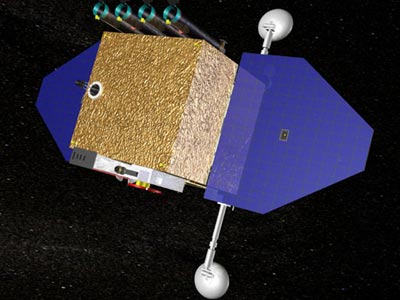How damaging is “Climategate” to NASA?by Taylor Dinerman
|
| NASA, as an agency whose mission is, in part, a scientific one, and which has been heavily involved in both the production and interpretation of earth science data, will inevitably suffer. |
Even worse, NASA has been using its considerable public outreach and information resources to present the AGW story as if it was fully settled science. As far back as 1987 Sally Ride wrote in a report to the NASA administrator in which she stated, “And now it is clear that human activity has a major impact on the evolution of the Earth System.” This attitude shows that for a long time there has been a fixed mindset within the agency. At the very least the Climategate revelations show that the data has been “improved” and that skeptics and even scientists who slightly dissent from the party line, have been mercilessly shut out of the mainstream debate.
The Climate Research Unit (CRU) at the University of East Anglia in Britain has its computerized climate model exposed as—to put it politely—an unreliable mess. It is no wonder that they didn’t want to release it under the terms of the UK’s Freedom of Information law. In the US, NASA’s Goddard Institute for Space Studies (GISS) has long been resisting disclosing its data following a US Freedom of Information Act (FOIA) request made by Chris Horner of the Competitive Enterprise Institute (CEI), a well-known skeptic. The CEI have announced that they intend to sue, something that should keep this scandal in the spotlight for a long time to come.
A supporter of the leader of the GISS program, James Hansen, claims that, “What made the GISS model unique was its use of some fine mathematical physics to reduce the amount of computation involved, so that it worked ten times faster than the other GCMs,” a reference to global climate models. If this is so, why hide it? Under normal circumstances it would be an outstanding achievement and the authors would be happy to see other scientists replicating their work and confirming their brilliance.
This is important since the CRU surface temperature charts have tracked closely with those from the GISS. If one result is now exposed as being polluted, then it is reasonable to imagine that the source of nearly identical data may be equally flawed. For NASA to be seen as hiding this, especially when it is obvious from the emails that the CRU made heroic efforts to prevent the release the information and the models on which it based, endangers the agency’s reputation for providing solid, untainted scientific information.
Looking beyond the GISS questions, the whole of what used to be called NASA’s “Mission To Planet Earth” (MTPE) and the Earth Observing System (EOS) needs to be reexamined in the light of Climategate. In April 1995 Congressman Bob Walker, chairman of the House Science Committee, wrote to NASA administrator Dan Goldin and, among other things, asked, “Is the current program adequately scoped to ensure that the data generated by MTPE/EOS will be appropriately processed, and will all the data be properly archived and made fully available for use by the scientific community?” The simple fact that Chris Horner needed to file a FOIA request for the GISS data shows that NASA may have a problem that goes beyond the GCM question.
A through and credible investigation of the whole of NASA’s earth science program seems a reasonable idea. NASA should demonstrate that the instruments on its satellites have not been “tweaked” to produce the desired results. This may become a very ugly process since the political stakes are so high. NASA as an institution is going to have to be extraordinarily careful to ensure that the evidence that it holds concerning its decades-long earth science programs has not been destroyed or tampered with. If the record shows anything like the notorious eighteen-and-a-half-minute gap from the Watergate scandal, the damage to NASA could be significant.
| A through and credible investigation of the whole of NASA’s earth science program seems a reasonable idea. |
Aside from the earth science part of agency’s operations, there are two other parts of NASA’s science program that may find themselves enmeshed in the climate change debate. One is the solar physics research programs, including Living With a Star, which hopes to launch their first probe, the Solar Dynamics Observatory, in February. Climategate shows that the debate on how much or how little influence the Sun has on our climate and on the climate of other planets in the solar system is still an open question.
The other, and even more difficult, area of investigation is cosmic radiation and its possible effects. For obvious reasons, astrophysicists who have been working in these fields are reluctant to get involved in the AGW debate. They have little to gain and a lot to lose. Inevitably they will be drawn into the argument. They should prepare themselves to face some hard questions.
The damage is not confined to NASA alone. As Dan Henninger wrote in the Wall Street Journal last week, “Hard science, alongside medicine was one of the few things left accorded automatic stature and respect by most untrained lay persons. But the average person reading accounts of the East Anglia emails will conclude that hard science has become just another faction, as politicized and ‘messy’ as, say, gender studies.”
